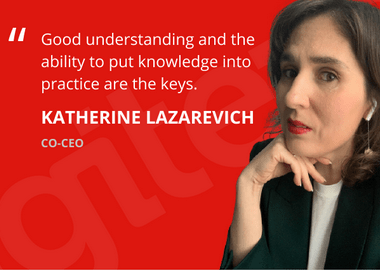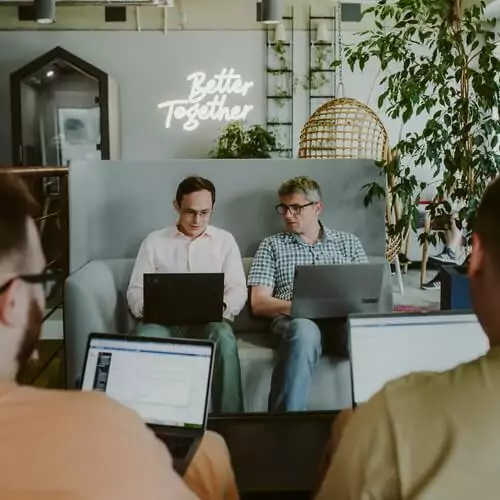What You Need to Know About Starting a Career at Digiteum: Part 2
Learn first-hand from our co-CEO, CTO, talent and management team about the recruiting, interview and onboarding at Digiteum.
Earlier in Part 1 of this guide we have talked to our talent management team about the recruiting and onboarding at Digiteum, candidates’ priorities and the tricks of finding talent in today’s booming market. It’s time to bring in the big guns!
In this part, we have a conversation with Digiteum’s CTO Viktor Lazarevich, co-CEO Katherine Lazarevich, and Project Managers — Tatsiana Saplitsa and Maxim Ilyin, who take part in the in-house interviews and make major decisions on growing the company and building up Digiteum’s brainpower.
Katherine, can you tell us a few words about the process?
Katherine: We have a well-established recruiting process. It depends on the project requirements and may be adjusted to the client’s in-house recruiting routine as well.
We start with a prescreen and verify basic soft skills. Then comes a tech interview (for engineering positions) — candidates are interviewed by our CTO, a tech lead or lead engineer who has experience in a given tech stack. Usually, it’s a one-hour interview that allows us to check both hard and soft skills. Candidates may also have one or more interviews with a client and sometimes are asked to make a test assignment.
Let’s talk in detail about the interview. Viktor, what do you focus on at technical interviews?
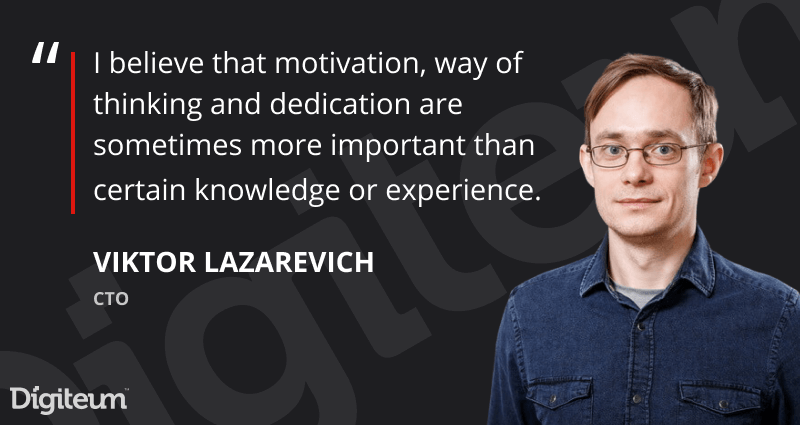
Viktor: First of all, I check the hard skills. Aside from that, I often ask questions that help me understand how motivated a person is. I’m curious to see how a person thinks, if he or she is keen on the topic, follows the news in the world of tech. It gives a good idea of the person’s worldview.
I note how people communicate — if they tend to stay on topic or give me a run-around. You can say a lot about a person by the way he or she develops an idea or thought.
There are a few negative markers I note too. For example, when a person instead of answering my question avoids it and talks about something else, usually something that he or she knows. It happens quite often.
I believe that motivation, way of thinking and dedication are sometimes more important than certain knowledge or experience. A person may be generally smart and skilled but lack specific knowledge simply because there hasn’t yet been a chance to get it. We have plenty of examples on our projects when we try things, explore new technologies and simply learn by doing.
Katherine: I want to add that we don’t normally focus on checking theoretical knowledge. Our goal is to figure out if a person understands and has a good sense of how to use the knowledge. You can learn and memorize something, but it doesn’t matter unless you can put it to use. Good understanding and the ability to put knowledge into practice are the keys. If we see this, we understand that a person will be able to absorb new knowledge and use it in practice.
Maxim, Tanya, what do you pay attention to? What gives away a good candidate?
Maxim: I pay close attention to how people express themselves, speak and behave at the interview. Tech knowledge is important, obviously. I’m also curious to see how people respond to questions they don’t know answers to — if they ask additional questions, make attempt to answer using logic and previous experience.
Tatsiana: I take into account many things; however, it usually takes about 5 minutes for me to instinctively understand if a candidate would fit the role. I make sure that a person answers my questions and can talk on the topic rather than give me a one-word answer. I note if a candidate is motivated to go through the interview, is interested in the project, has the experience and desire to grow. It’s important that a person is generally positive and there are no open negativity and ignorance. And of course, tech skills are essential — I rely on our tech specialists to judge. No matter how much I may like a candidate, he or she won’t pass without appropriate skills.
Do you have a signature question?
Viktor: When it comes to technical verification, I may ask a tricky question that has no single right answer, for instance, if there are two schools of thought. I’m curious to hear how a person will reason, explain his or her opinion and show the way of thinking.
Katherine: I ask candidates to talk about their experience. Many believe that this question is only good if you haven’t read a CV or is asked simply out of habit. In reality, this is a great question that helps you understand what moves a person. You learn about people’s attitude to their projects and work in general. You can tell a lot by their lexis too.
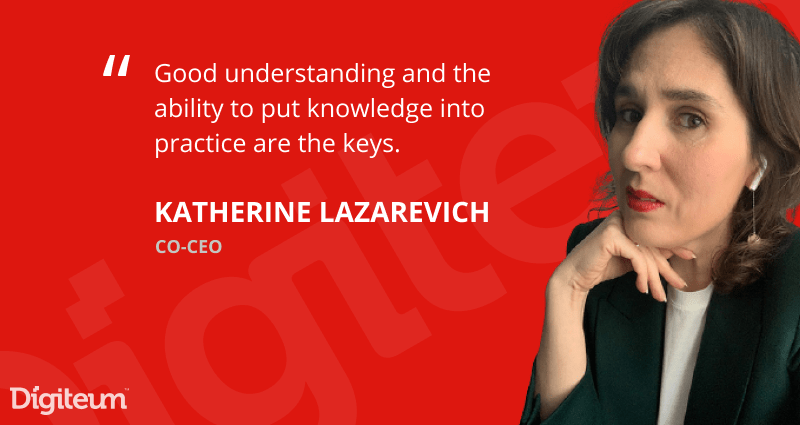
Katherine, you prefer to interview candidates personally. Why?
Katherine: I interview fewer people now, but I indeed used to interview everyone before. IT is a people industry, and people are our most precious asset. I have always known that screening people by hard skills only is not enough. We need to know if a person can fit the company’s culture and if our expectations will match.
People say that I sometimes don’t sell the company well enough. Probably because I prefer not to give empty promises as I feel responsible for every word I say.
When I interview candidates, I’m trying to figure out if they will be able to fit the project, its team and working environment. It works the other way around. I need to make sure that what we offer to a candidate responds to his or her ambition and interests. For instance, if a person has certain career goals, I honestly talk about whether there are perspectives to fulfill these goals on the job we offer.
Whenever we make an offer and talk to a person about some position, we are trying to be completely honest and open about what he or she will be dealing with. You see, we normally hire for long-term projects, so we must avoid any failed expectations on both sides. We need to make sure a person will be happy to stay with us for a long time.
How do you decide who else will be on the interviewing team?
Katherine: As a rule, the interviewing team consists of the people a person will be working with. It allows candidates to ask necessary questions, learn about the project first-hand and get to know the team.
If we don’t have a team on a project yet, it’s usually me and Viktor who interview candidates. I also take part in the interviews for the projects that I oversee.
Maxim, Tanya, do you take on the interviews that relate to your projects?
Maxim: Yes, and I also interview people for positions related to my tech experience.
Tatsiana: Usually, I interview for the projects that I lead. I have interviewed candidates for other projects several times and even had a chance to bring in one engineer to my team after his major project was over.
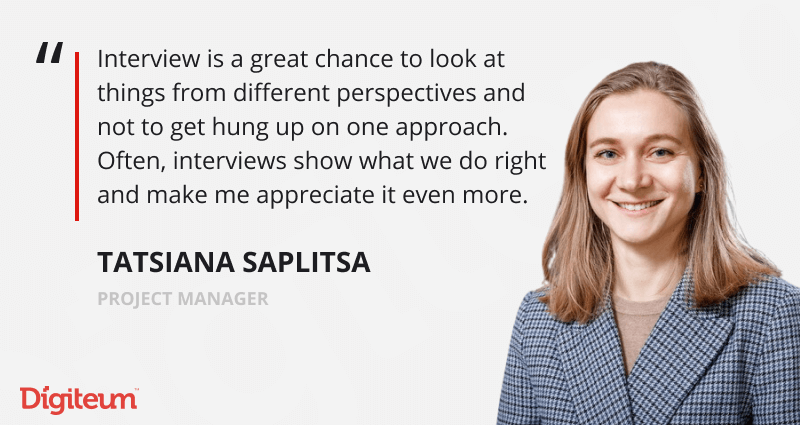
What do you speak about when you tell candidates about your project?
Maxim: As a rule, candidates get a general idea about the project at the prescreening stage. Later, we speak about it in detail at the end of the technical interview. During the interview, candidates share what’s important for them, and it gives us a good idea of what we should focus on when talking about the project. For instance, if a person is interested in a certain tech stack, I single out if the project gives an opportunity to work on it.
And obviously, there are some basic things. If we talk about our work with Printique, I mention that it’s a large project that provides many different opportunities and gives a chance to work with a very skilled team. It is also a long-term steady project with a well-established process.
Tatsiana: Agree, I learn what is important for a candidate and mention it when we speak about the project. My goal is to show value in the project so that candidates don’t see it as just an ordinary job. I always talk about tech stack, team, specifics, future responsibilities and sometimes mention process and project length. It’s crucial to motivate a person and at the same time to tell only the truth so that not to deal with failed expectations afterward.
Do you enjoy interviewing people?
Tatsiana: Yes, it’s a great chance to look at things from different perspectives and not to get hung up on one approach. Often, interviews show what we do right and make me appreciate it even more. In other cases, an interview gives an idea of what we are missing and could work on. Sometimes, we have such hilarious candidates that it’s just fun to talk to even if we won’t end up hiring them.
What about you, Maxim?
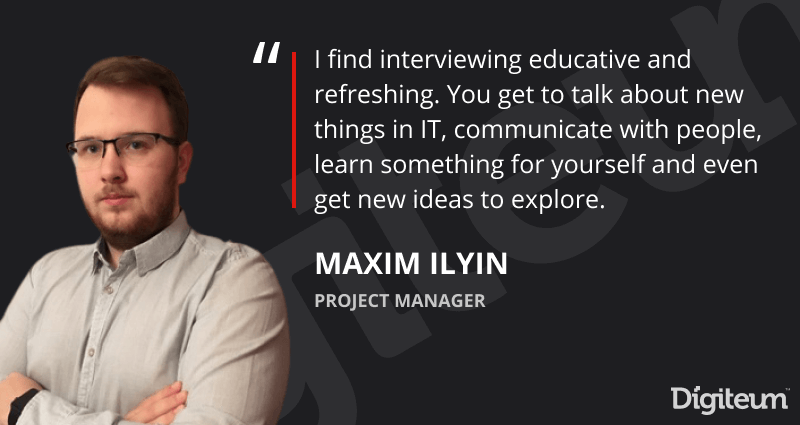
Maxim: I do, actually, I find it very educative and refreshing. You get to talk about new things in IT, communicate with the people in the field, learn something for yourself and even get new ideas to explore.
Katherine, what is your favorite position to interview for?
Katherine: I prefer interviewing people for technical positions because it’s easier to figure them out and form an objective opinion as opposed to, for instance, design roles that usually involve a more subjective point of view. I easily interview QA and management positions thanks to my personal experience.
Do you use your intuition when you make decisions about candidates?
Viktor: Of course. Intuition is very important, at least at this point. Perhaps, there will be a time when our processes will be worked out to the point that we have just a set of objective metrics. Right now, intuition plays an important role.
Katherine: It depends on what you consider intuition. I believe that often what we call intuition is a very solid skill that has been forged out of the experience. It is the result of self-reflection and the ability to make quick decisions based on experience.
Wow, looks like we have just scratched the surface of some very deep stuff. If you are curious to learn more about Digiteum culture, the opportunities we provide in Poland and Belarus and get a glimpse of onboarding in the home office environment, go ahead and check Part 1 of this guide (if you haven’t yet).
Right now, we have about a dozen middle and senior-level opportunities for engineers in Poland and Belarus. Check out Career page to see if there’s anything that matches your goals and aspirations and hit us up at [email protected].


